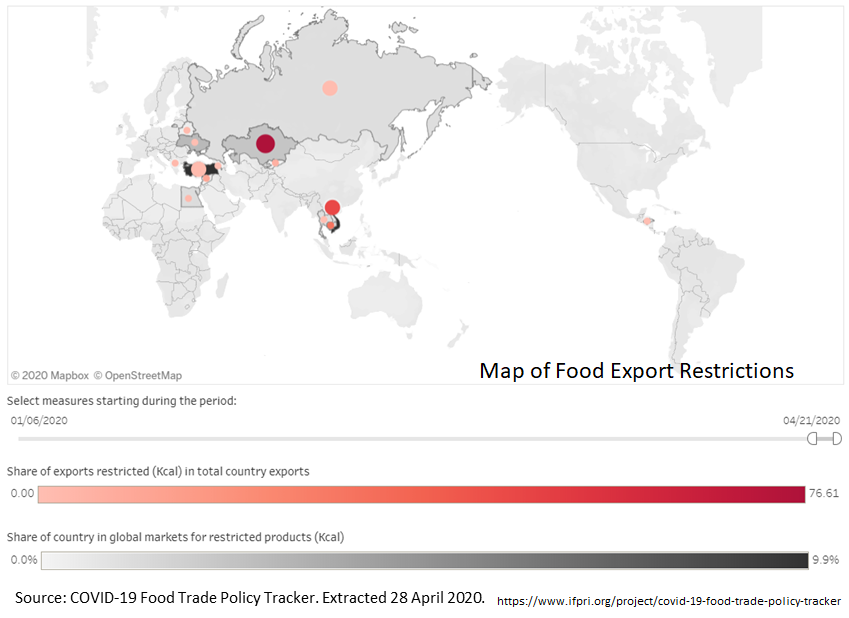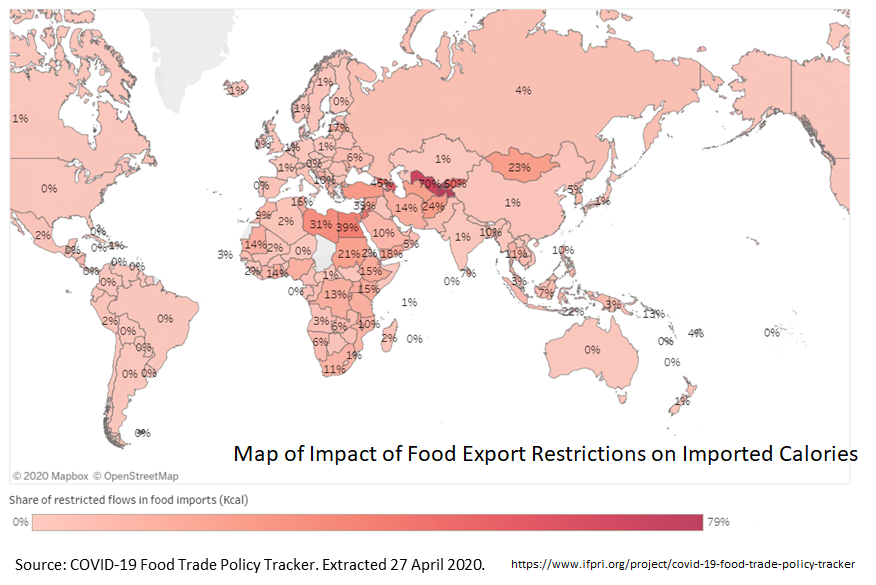Pick Up
27. New Coronavirus Pandemic ― IFPRI Dashboard: Tracking the Impact of COVID-19 on the Global Food Market

Japan is the world's third largest grain importer with a calorie-based self-sufficiency rate of only 37% (Pick Up 11). The shortage of food products that that use wheat flour has become a hot news topic probably because of concerns that restrictions by exporting countries due to the novel coronavirus infection (COVID-19) may affect Japan's food security, which depends on international trade. On the other hand, the Government of Japan and the Ministry of Agriculture, Forestry and Fisheries (MAFF) have stated that as of May 1, 2020, sufficient reserves for rice and wheat have been secured, and there is no delay in imports from overseas.
While the impact of COVID-19 on the global economy is increasing, it is said that sufficient global inventory is secured in the grain market, and grain prices remain relatively stable compared to oil and metal prices (Pick Up 24). However, looking back on the experience of the 2008 global food crisis, it cannot be denied that protectionist actions of major exporters could lead to Domino effects of increasing food prices and threaten the food security of importing countries. The international community must monitor the ever-changing policy movements of food-exporting countries and their impact on food-importing countries, and provide accurate and systematic information on food supply and demand through international cooperation (Pick Up 9).
The International Food Policy Research Institute (IFPRI) has launched COVID-19 Food Trade Policy Tracker since March 2020, to provide an up-to-date data on food trade policy of each country and to analyze the impact of the COVID-19 crisis and on the global food market. The IFPRI captures changes in food trade policy in response to the COVID-19 crisis using systematic and ad hoc data gatheringfrom both official and unofficial sources. The system creates impact indicators by combining such information with detailed trade data and data on caloriec value of food trade to give an idea of the magnitude of each policy’s effect. The data are updated daily and are available for access and download.
According to IFPRI, at the time of writing the report (April 28), 15 countries are implementing export controls mainly related to staple food crops in response to COVID-19. The share of globally traded calories that has been impacted at around 5 percent is still relatively small, as compared to the19 per-cent of globally traded calories impacted by the 2007-2008 food price crisis with 33 countries implementing export restrictions. On the other hand, some countries are already concerned about the significant food security impacts. For example, Kyrgyzstan relies on importing wheat and flour products from Kazakhstan for most of its calories, but Kazakhstan bans the export of wheat and flour. As a result, 50% of Kyrgyzstan's imported calories will be subject to export restrictions.
Today, free trade is essential to ensuring food and nutrition security for people around the world, but it is of greater importance in the face of the global crisis. COVID-19 is a challenge for all human beings, and it cannot be solved by one government alone. It is now essential to maintain food and nutrition security in all countries around the world through trade cooperation.
References
IFPRI COVID-19 FOOD TRADE POLICY TRACKER.
Laborde Debucquet, David; Mamun, Abdullah; and Parent, Marie. 2020. Documentation for the COVID-19 food trade policy tracker: Tracking government responses affecting global food markets during the COVID-19 crisis. COVID-19 Food Trade Policy Tracker Working Paper 1. Washington, DC: International Food Policy Research Institute (IFPRI).
MAFF. About new coronavirus infection (In Japanese). Accessed on May 3, 2020.
Pick Up 11. New Coronavirus Pandemic ― International Trade and Food Security
Pick Up 24. New Coronavirus Pandemic ― World Bank Report: Implications of COVID-19 for Commodities
Contributor: IIYAMA Miyuki (Research Strategy Office)


